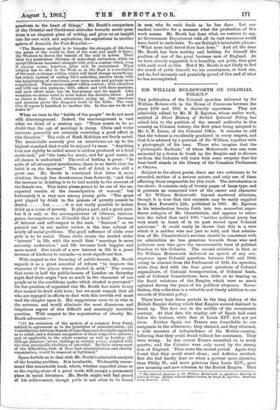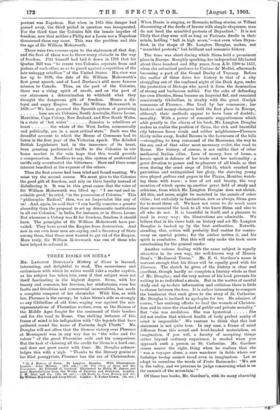SIR WILLIAM MOLES WORTH ON COLONIAL 'POLICY.*
THE publication of the Colonial speeches delivered by Sir William Molesworth in the House of Commons between the years 1838 and 1853 is distinctly opportune. They are admirably edited by Mr. H E. Egerton, whose earlier work, entitled A Short History of British colonial Policy, has raised him to the position of the seconz authority in this country on Colonial history, the first place being assigned to Mr. C. P. Lucas, of the Colonial Office. It remains to add that the volume is excellently produced in every respect, and that it is adorned by a portrait of Sir William, together with a photograph of his bust. Those who imagine that the "philosophic Radicals," of whom Molesworth was one, were animated by a desire to break up the Empire and to divorce us from the Colonies will learn with some surprise that the bust itself stands in the library of the Canadian Parliament at Ottawa.
Subject to the above praise, there are two criticisms to be recorded, neither of a serious nature, and only one of them affecting those responsible for this work. The introduction is too short: it consists only of twenty pages of large type, and it presents no connected view of the career and character of Sir William Molesworth beyond scattered allusions, though it is true that this omission may be easily supplied from Mrs. Fawcett's Life, published in 1901. Mr. Egerton in his introduction breaks forth into two somewhat super- fluous eulogies of Mr. Chamberlain, and appears to enter- tain the belief that until 1895 "neither political party has very much to boast of in its past record upon Colonial questions." It could easily be shown that this is a view which it is neither wise nor just to hold, and that admira- tion of Mr. Chamberlain's services should be consistent with an admiration no less generous towards those wise and judicious men who gave the immeasurable boon of political freedom to the Colonies. The second criticism is that, as Sir William Molesworth delivered no speech of any con- sequence upon Colonial questions between 1840 and 1848, owing to absence from the Parliament of 1841, his speeches, while they deal with the four great questions of Colonial expenditure, of Colonial transportation, of Colonial lands, and of Colonial Constitutions, have little or no bearing on the fiscal relations of the Empire, which were so much agitated during the years of his political abeyance. Never- theless, this collection is a valuable and timely addition to our records of Colonial policy.
There have been three periods in the long history of the British Empire during which that Empire seemed destined to break up. The first was in the middle of the seventeenth century. At that date the mighty orb of Spain had sunk below the horizon, while that of Louis XIV. had not yet risen. Neither Spain nor France was formidable to our emigrants in the wilderness; they claimed, and they obtained, a wide measure of independence of the Mother-country, believing that they could stand without her assistance. They were wrong. In due course France assaulted us in every quarter, and the Colonies were only saved by the strong arm of England. Then came the second period. Again they found that they could stand alone; and Anferic,a, revolted. But she had hardly done so when a portent more alarming than Philip II., and more grievous than Louis XIV., gave new meaning and new cohesion to the British Empire. That 5" The Selected Speeches of Sir WIllumn Molestoorth on Questions Relating to Colonial Policy.. E4ited, with an Introduction, by liugh E. Egerton. London; John lEurray. [15s.] portent was Napoleon. But when in 1815 this danger bad pulsed away; the third -period in" question was inaugurated. For the third time the Colonies felt the innate impulse of freedom; now that neither a Philip nor a Louis nor a Napoleon threatened them any more. This was . the problem and this the age of Sir William Molesworth.
There were two courses open to the statesmen of that day, and the first of these was to throw every obstacle in the way of freedom. Pitt himself had laid it down in 1791 that his Quebec Bill was "to create two Colonies separate from and jealous of each other, so as to guard against a repetition of the late unhappy rebellion" of the United States. His view was law up to 1838, the date of Sir William Moleswortb's first great speech, and of Lord Durham's still more famous mission to Canada. Thus, on the part of the Colonies, there was a rising 'spirit of revolt, and on the part Of our statesmen a determination to withhold what they thought the dangerous gift of freedom. Hence a dis- loyal and angry Empire. Hear Sir William Molesworth in 1838 :—" We have pursued the Spanish system of governing here are six Colonies, South.Australia, Sierra Leone, Mauritius, Cape Colony, New Zealand, and New South Wales, in a state of hot water' Jamaica is rebellious at heart • the whole of the West Indies, economically and. politically, are in a most critical state." Such was the dreadful account to which the House of Commons had to listen in the first year of the Victorian epoch. The deluded British Legislature had, in the innocence of its heart, been granting preferential tariffs to the Colonies in our home market in the vain hope that this would provide a compensation. Needless to say, this system of preferential tariffs only accentuated the bitterness. Here and there some interest benefited at the expense of the others.
Thus the first course had been tried and found wanting. We musty try the second course. We must give to the Colonies the good gift of freedom, and rely on their loyalty instead of, disbelieving it. It was in this great cause that the voice of Sir William Molesworth was lifted up : "I see vast and in- evitable good," he cried, "in the possession of Colonies." This "philosophic Radical," then, was an Imperialist like any of us! ;.And, again, he said that "I can hardly conceive a greater absurdity than the proposal to set up democratic institutions in all our Colonies," in India, for instance, or in Sierra Leone. But whenever a Colony was fit for freedom, freedom it should have. The -principles of Sir William Molesworth have pre- vailed.. They have saved the Empire from destruction. And now in our own hour men are saying, and a Secretary of State among them, that those men wanted to get rid of the Empire. More truly, Sir William Molesworth was one of those who have helped to refound it.







































 Previous page
Previous page